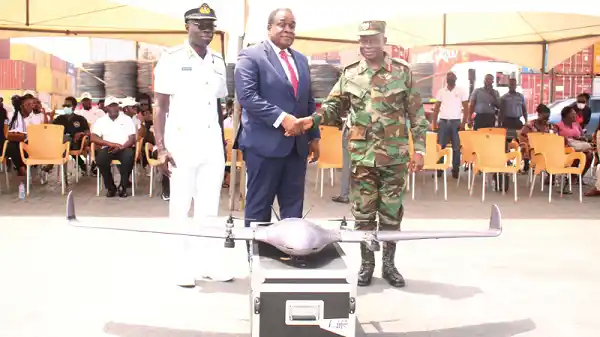Drones helps naval strategists gain real-time information and data. The Ghanaian Navy has began operating small unmanned aerial vehicles (S-UAVs) to improve it’s maritime awareness and surveillance capabilities.
In May 2022, the Ghana National Petroleum Corporation (GNPC) presented two surveillance drones to the Ghana Boundary Commission (GBC) and the Ghana Navy to aid the two institutions to monitor the country’s maritime boundaries.
The Deputy Chief Executive Officer (CEO) in charge of Finance and Administration at the GNPC, Benjamin Kweku Acolatse, said the equipment, costing about $400,000, and the support to the commission had become necessary to scale up security in the country’s maritime domain.
The drones will assist the Ghana Navy in particular to detect and monitor vessels remotely.
They are also to assist in surveillance and the tracking of suspicious activities, as well as monitor remote offshore or isolated sites.
Each of the Delta Quad Surveillance drones is fitted with a GPS-controlled camera that allows for on-board recording.
Also, each has a flying time of 110 minutes, a wingspan of 235 centimetres and a wing area of 90 square metres.
The DeltaQuad Pro #VIEW offers state-of-the-art features that are not offered by any other VTOL surveillance UAV on the market
The DeltaQuad Pro is equipped with a high grade surveillance camera. The available surveillance packages range from entry-level nose cameras to state of the art computer guided thermal & RGB controllable gimbals.
Likewise, earlier in March 2022, the Ghana Navy received surveillance drones to enhance the training of personnel in electronic warfare to ensure security in the maritime sector.

A defence and technology company, Omnicad, presented the ZMO-120 drones with a 60-minute endurance capacity, capable of flying a distance of 40 kilometres at a maximum speed of 110 kilometres per hour.
ZMO-120 is a fixed-wing VTOL aircraft with a three-axis tilting structure which is efficient and easy to operate.
The Chief Executive Officer (CEO) of Omnicad Group, Mr Michael Zormelo, presented the drones to the Chief of Naval Staff, Rear Admiral Issah Adam Yakubu, at the closing ceremony of an eight-week training for 13 naval officers on March 24.
The training was to equip the personnel on the operation, maintenance and use of the devices to identify security threats within the maritime domain to mitigate the risks within the country’s Exclusive Economic Zone (EEZ).
The Director of Training at the Navy Headquarters, Capt Dennis Eghan, said that the training exercise was conducted in collaboration with the Signal Training School & Soko Aerial Centre of the Ghana Armed Forces.
He said it would help personnel to perform better to aid critical response at sea.
The Flag Officer Commanding of the Eastern Naval Base, Commodore Emmanuel Ayensu Kwafo, indicated that crimes such as piracy and illegal and unreported fishing had assumed a transnational nature and as such undertaking surveillance of the country’s maritime domain was imperative.


